¿Quieres añadir el sistema de comentarios Disqus a tu sitio web WordPress?
Disqus es una de las plataformas de comentarios más populares del mercado. Es conocida por su interfaz fácil de usar y su servicio de alojamiento de comentarios, lo que la convierte en la opción preferida de sitios populares como PBS y Bloomberg.
En esta guía, hablaremos acerca de si debería añadir Disqus a su sitio web y cómo activarlo en WordPress.

¿Debería usar Disqus con WordPress?
Aunque el sistema de comentarios por defecto de WordPress es adecuado para comentarios sencillos, no es el más potente. Por eso muchos usuarios de WordPress buscan alternativas como Disqus.
El sistema de comentarios Disqus es bastante popular entre los sitios web a gran escala. Además de su facilidad de uso y sus opciones de personalización, también ofrece una plataforma de alojamiento de terceros para almacenar y gestionar comentarios.
Dado que Disqus gestiona los comentarios en un servidor independiente de su alojamiento WordPress, su uso puede ayudar al rendimiento general de su sitio web.
Dicho esto, en nuestra opinión, Disqus no es el mejor sistema de comentarios que hemos probado. Aunque ayudó al rendimiento de nuestro sitio web, no nos gustó su capacidad de moderación y añadía enlaces de afiliados a nuestro contenido sin nuestro permiso.
Después de desactivar Disqus, vimos que nuestra tasa / tarifa de participación aumentó significativamente. Puedes leer más acerca de nuestra experiencia en nuestra reseña / valoración de Disqus.
Por supuesto, si usted decide utilizar Disqus u otras plataformas depende de usted. Pero si usted está buscando alternativas Disqus, entonces tenemos algunas recomendaciones.
Qué utilizar en lugar de Disqus
Después de probar diferentes plugins de comentarios, hemos encontrado que Thrive Comments es la mejor alternativa a Disqus.
Thrive Comments es un plugin de comentarios todo en uno con una interfaz fácil de usar que es perfecto tanto para principiantes como para expertos en blogs.

Además de las características de gestión y moderación de comentarios, puedes utilizar Thrive Comments para impulsar la participación de los usuarios con acciones posteriores al comentario. Después de que el usuario deje un comentario, puedes redirigirlo a entradas relacionadas o a un mensaje de agradecimiento personalizado con un regalo gratuito.
Además, puedes añadir “me gusta” y “no me gusta”, así como “upvotes” y “downvotes” para fomentar la interacción del público en tu sección de comentarios.
Para más detalles, puedes ver nuestra reseña / valoración de la solución completa de Thrive Themes, que contiene una sección específica acerca de los comentarios de Thrive.
Si Thrive Comments no se adapta a tus necesidades, también puedes comprobar nuestro listado completo de los mejores plugins de WordPress para mejorar los comentarios.
Si todavía está interesado en utilizar Disqus, no se preocupe. Le explicaremos cómo añadir el plugin del sistema de comentarios Disqus. Puede utilizar los enlaces rápidos para omitir las diferentes secciones:
Establecer el sistema de comentarios Disqus en WordPress
El primer paso para instalar comentarios Disqus en WordPress es crear una cuenta Disqus. Para ello, tienes que ir al sitio web de Dis qus y acceder.
Una vez que lo hayas hecho, deberías ver la siguiente página. Sigue adelante y haz clic en “Quiero instalar Disqus en mi sitio”.
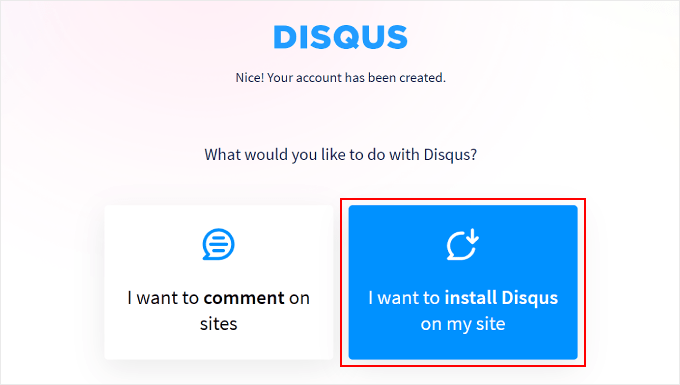
En la página siguiente, tendrá que añadir los datos de su nuevo sitio Disqus, que es donde gestionará todos sus comentarios Disqus. Estos incluyen Propietario del sitio, Nombre del sitio web y Categoría.
En el campo Nombre del sitio web, puede introducir el subdominio del sitio web de Disqus que desee. A continuación, simplemente haga clic en “Crear sitio”.
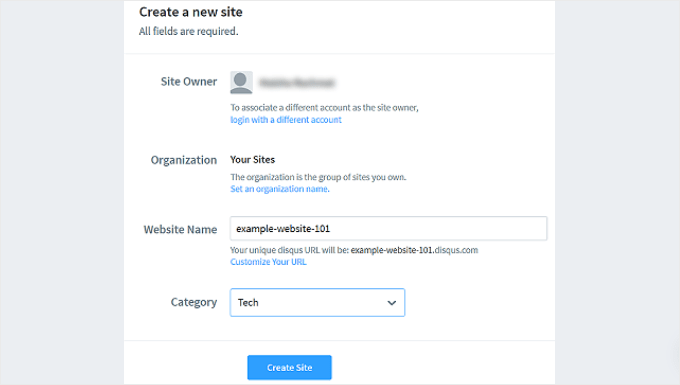
Llegará al Escritorio del sitio de Disqus.
En este punto, tendrá que elegir uno de los planes de Disqus para poder establecer el sistema de comentarios en WordPress. Si aún no estás seguro de cuál usar, puedes empezar con el plan básico gratuito.

Ahora se le pedirá que elija una plataforma.
Selecciona “WordPress” para continuar.
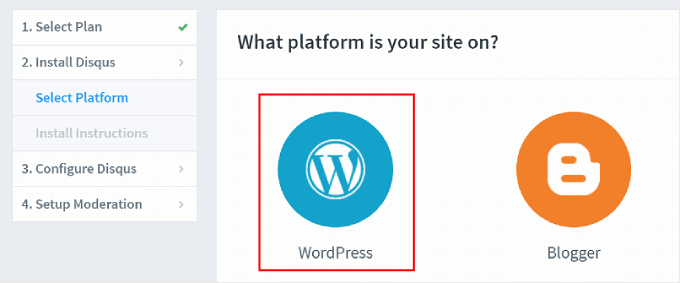
Ahora verá la página de instalación de WordPress. Fíjate en el campo Installation Token, que te será útil para la configuración más adelante.
Puede dejar esta pestaña abierta mientras continúa con los pasos siguientes.
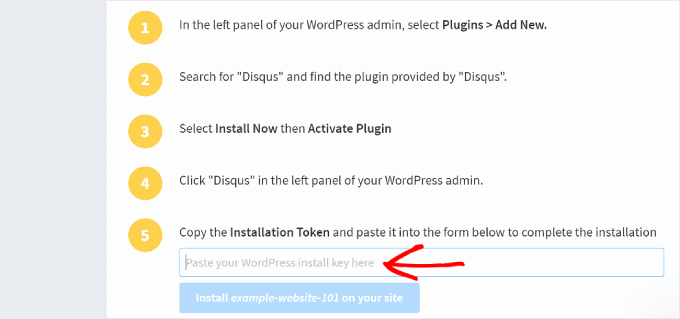
Ahora, abre tu escritorio de WordPress para instalar el plugin Disqus Comment System. Para obtener instrucciones paso a paso, marcar / comprobar nuestra guía sobre cómo instalar un plugin de WordPress.
Después, vaya al menú Disqus desde su escritorio de WordPress. En “¿Tienes una cuenta Disqus?”, haz clic en “Sí”.
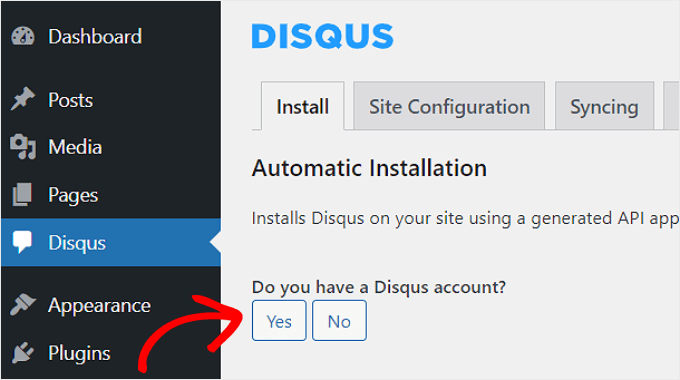
Ahora aparecerá la pregunta: “¿Tiene un sitio registrado en Disqus que desee utilizar?”.
Seleccione “Sí”.
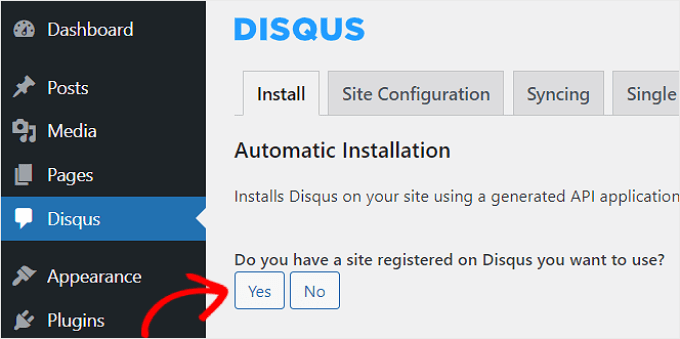
En este punto, verás algunas instrucciones de instalación de WordPress y un token de sincronización para copiar.
A continuación, haz clic en el botón “Copiar”.
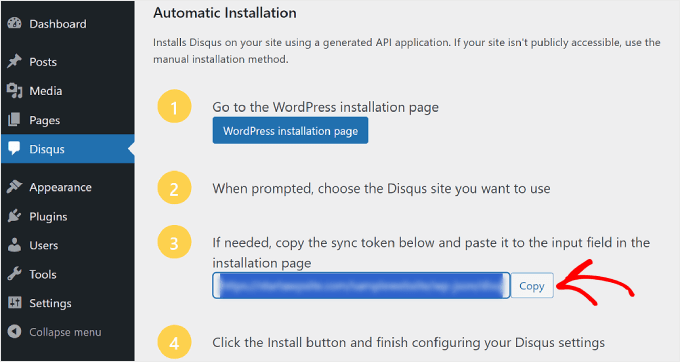
Volvamos ahora al sitio web de Disqus. Pega el token que acabas de copiar del escritorio de WordPress en el campo correspondiente.
A continuación, pulsa el botón “Instalar [nombre del sitio Disqus] en tu sitio” y haz clic en “Configurar” en la parte inferior.
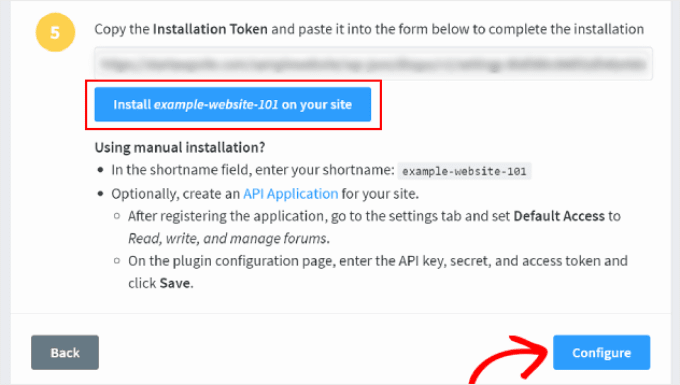
¡Y ya está!
Si actualiza el menú de Disqus en su escritorio de WordPress, debería ver una interfaz similar a esta:
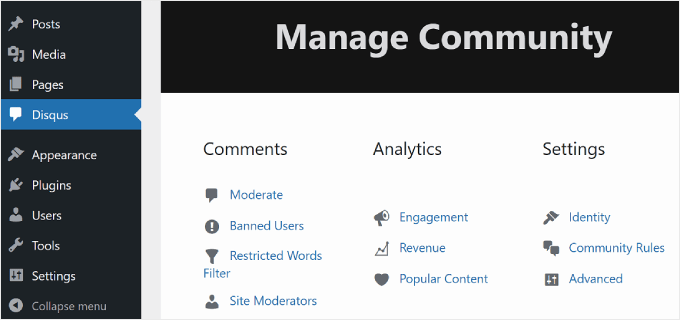
Ahora, vamos a ver si Disqus se ha activado / activado correctamente en su sección de comentarios.
Basta con abrir una entrada de un blog de WordPress en la interfaz y desplazarse hasta los comentarios. Este es el aspecto que debería tener si la instalación se ha realizado correctamente:
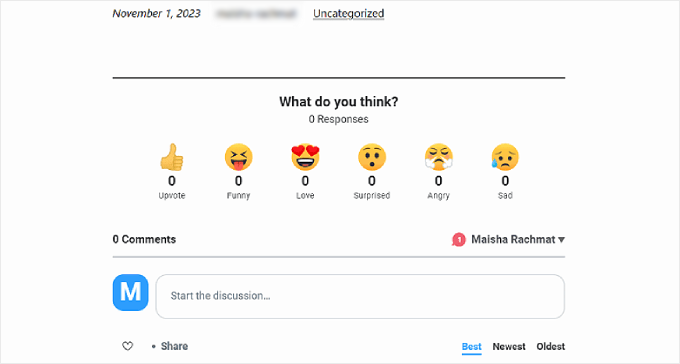
Exportar comentarios antiguos de WordPress a Disqus
Una vez que haya instalado el sistema de comentarios Disqus, éste se hará cargo de los comentarios nativos de WordPress en su sitio. En otras palabras, los comentarios existentes almacenados en su sitio web de WordPress no serán visibles para los usuarios.
Para corregirlo, tendrás que importar los comentarios existentes al sistema de comentarios de Disqus. En el área de administrador de WordPress, vaya a la página de ajustes del plugin Disqus, desplácese hacia abajo y navegue hasta la pestaña “Sincronización”.
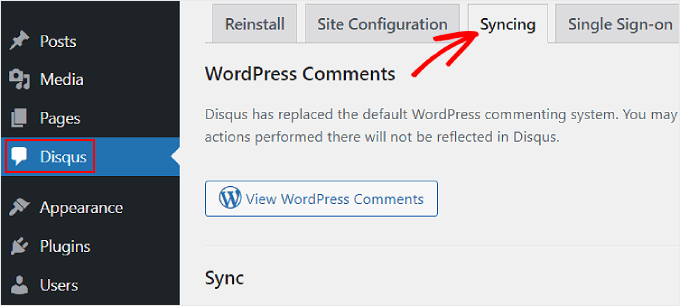
A continuación, desplácese hacia abajo y seleccione “Importar comentarios”.
En la tabla de la parte inferior verá cuáles de sus comentarios se han importado correctamente.
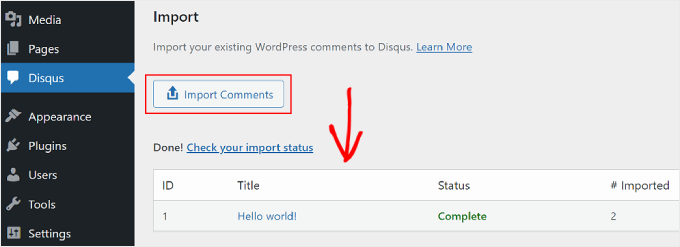
Una cosa a tener en cuenta es que si usted tiene tipos de contenido personalizado, entonces usted puede notar que sus comentarios más antiguos no están apareciendo después de cambiar a Disqus. Para resolver esto, tendrá que desactivar Disqus en tipos de contenido personalizado.
Para una guía práctica, compruebe nuestro artículo sobre cómo desactivar Disqus en tipos de contenido personalizados.
Moderación y configuración de los comentarios de Disqus
Si desea moderar los comentarios mediante Disqus, puede hacer clic en el botón “Moderar” de la página del plugin de Disqus.
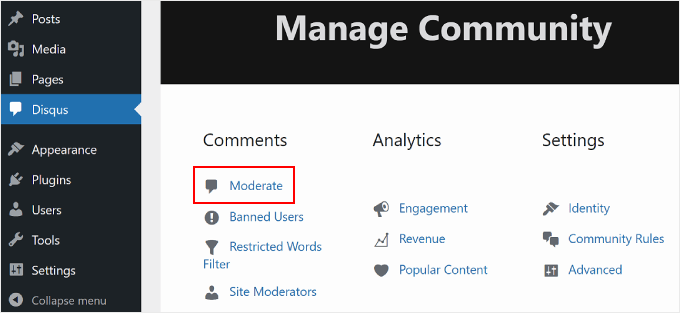
Esto le llevará a la página de moderación en el sitio web de Disqus.
Si estás familiarizado con la página de comentarios de WordPress, navegar por la de Disqus no te supondrá ningún problema. Aquí puedes aprobar, borrar o marcar comentarios como Spam.
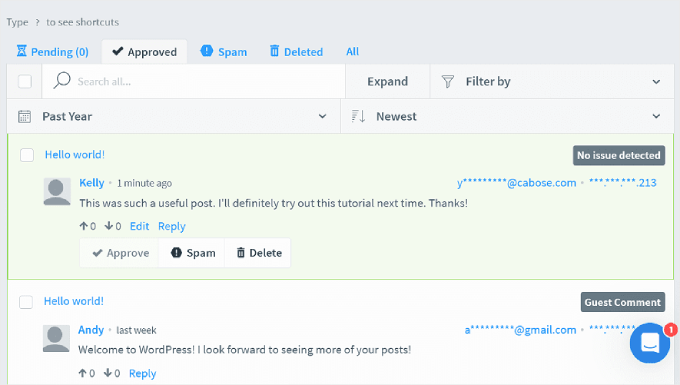
Para obtener consejos y trucos sobre la moderación de comentarios en WordPress, puede comprobar los siguientes artículos:
- Guía para principiantes sobre cómo moderar comentarios en WordPress
- Cómo permitir que los usuarios de un blog moderen los comentarios en WordPress
- Cómo permitir a los usuarios editar sus comentarios en WordPress
Diagnosticar el problema de visualización de comentarios de Disqus
En algunos temas de WordPress, el área de comentarios de Disqus puede aparecer más ancha que el resto del área de entradas. Para corregirlo, tendrás que añadir CSS personalizado a la hoja de estilos de tu tema o tema hijo.
Aunque puedes añadir CSS personalizado a través del editor de archivos del tema, no te lo recomendamos. El seguimiento de los cambios se vuelve complicado, por lo que no está claro qué código es del tema y cuál es personalizado.
En su lugar, le sugerimos que utilice WPCode, que es el plugin de fragmentos de código más sencillo. Le permite añadir y gestionar de forma segura código personalizado en su sitio de WordPress. Si el código no funciona, puedes quitar / eliminar fácilmente el fragmento de código dentro del plugin.
A continuación encontrará el código que deberá añadir:
#disqus_thread {
margin: 0 auto;
max-width: 650px;
}
Este CSS establece el ancho máximo del área de comentarios en 650px y lo centra en la pantalla. Tu tema puede tener un ancho diferente, por lo que tendrás que ajustarlo para satisfacer tus necesidades.
Para un tutorial paso a paso, puede leer nuestra guía sobre cómo añadir fácilmente CSS personalizado a su sitio de WordPress.
Este es el aspecto que debería tener en WPCode:
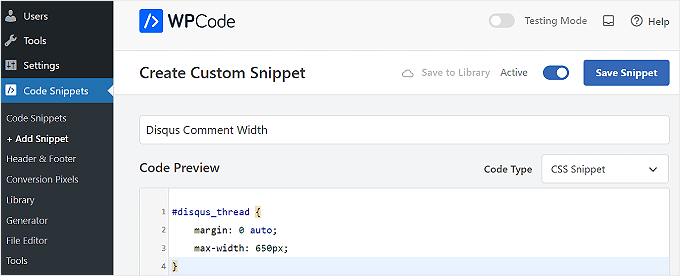
¡Y eso es todo para añadir Disqus a WordPress!
Esperamos que este artículo te haya ayudado a aprender cómo añadir el sistema de comentarios Disqus en WordPress. También puedes comprobar nuestra guía práctica sobre cómo marcar o enterrar comentarios en WordPress y nuestra selección de los mejores plugins de WordPress para hacer crecer tu sitio web.
If you liked this article, then please subscribe to our YouTube Channel for WordPress video tutorials. You can also find us on Twitter and Facebook.





Syed Balkhi says
Hey WPBeginner readers,
Did you know you can win exciting prizes by commenting on WPBeginner?
Every month, our top blog commenters will win HUGE rewards, including premium WordPress plugin licenses and cash prizes.
You can get more details about the contest from here.
Start sharing your thoughts below to stand a chance to win!
Nazmul Koushik says
Hi, Thank you So much for this tutorial .
WPBeginner Support says
Glad our guide was helpful
Administrador
Danielle says
How would I go about making sure that my Disqus comments from my old Blogger site appear on my new WordPress site? I just used your setup service to transfer my content from Blogger to WordPress last month.
WPBeginner Support says
If your Disqus coments are not available then you would go into Disqus and export the old comments to import them to the new site.
Administrador
Deepak jerry says
Thank You So Much For This Tutorial !
WPBeginner Support says
You’re welcome
Administrador
Deepa says
Thanks for ur information
WPBeginner Support says
You’re welcome
Administrador
David says
This information has helped me integrate disqus comment system to my personal website. Thank you so much.
WPBeginner Support says
Glad our article could help
Administrador
Nihal Singh says
Thanks for the useful article to add the comments in WordPress. It is very useful.
WPBeginner Support says
Glad you found our content helpful
Administrador
Irene Hynes says
Hi There,
Hip Hip Hooray! I was always told that slightly slow in the head, a slow learner. Not anymore! It’s like you have my back. I can’t tell you how much I’ve learnt here and how easily! Thank you for blessing me with this effortlessly ingestible digestible content.
I was wondering if it was possible assign to a variable type of Array of Strings a value from the REFramework Config file.
Thank you very much and will look for more postings from you.
Kind Regards,
Irene Hynes
John says
Is there any way to use both Disqus comment and WordPress comment together or separately?
Mike says
Hey Guys!
I am going to have my site
I intend to optimized my site and incresed the speed of loading page. which plugin do you suggest?
Thanks in advance
Mike
Hitesh Sharma says
I was looking for so long for this type of informative post on Discus. Thanks alot
Jagadish Prasad B says
Hello, I am Jagadish. I added Disqus comment system on my website, but it’s not working. What happen is by mistake I deleted the site from Disqus, before that it’s worked properly. After deletion, I re-added it into Disqus but it’s not working, I tried so many times. Please help me.
Agus Tamanuri says
Thanks
Because this article is help me .. and one more
I will make this blog name into the shirt. Is it allowed?
daniel says
Thanks!
Ahmad says
Thanks for ur information
Rachael Portier says
Every time I log into Disqus through WordPress it keeps telling me “Unable to connect to the Disqus API servers”. I’m sure my email and password are correct though. Please help!
ide says
i have same problem,
chukwudi ojukwu says
thanks for the info. i just install disqus on my site with your guide.
Scott Johnson says
Good article, but I am wondering why this current post is not setup with the Disqus plugin? Change of heart?
Dwayne says
Thanks for this post. Just implemented it though i’m yet get the confirmation email from them after creating the account more than 12 hrs ago. Oddly i got an email after setting it up on my wordpress site but yet to get the confirmation email.
Biju says
I’m really glad to meet your blog. Finally I’ve found my solution for WP site… Thanks again.
Antony says
Hey,
Thanks for the Post – Just now Set Up Disqus on my Website! D
GroomingMail says
Hey, quick question. I have just installed Disqus and previously had a spam filter (WP-SpamShield) can i now remove the filter as Disqus has its own spam filter or should i keep the WP-SpamShield plugin?
Thanks,
WPBeginner Support says
Yes you can.
Administrador
Theo Ramlall says
As always, another well written article from wpbeginner.com
I started of seeking help with my problem, which was the size of the over lapping comment bar but grateful your CS hack above did fix it. However I would be overjoyed in having a comment system exactly like this….if you could provide some know-how..?
Best Regards
Theo
Aishwarya says
Hey,
By default, Disqus appears on your posts, not pages. In case you are looking to add Disqus to a particular page on your wordpress website, you can try this simple hack I used.
Just plugin the universal code at the end of your page in WordPress’s text editor. It works well for me,
mukekaton says
Disqus not appear on wordpress page. Only in post appear. How do I make disqus appear on page?
Arbin says
Which is that universal code? bc to me doesn’t show also in posts.
Aaron Jane says
Hello,
I’m getting lot of spams on my site with the default comment system, though I have akismet installed. Thought about using Disqus, but I see that Disqus is no longer used by wpbeginner. Can you share why you moved away from disqus ?
Thanks Aaron.
WPBeginner Support says
Here is why we switched away from Disqus.
Administrador
Theo says
Thanks a whole lot for this post. I’ve decided to start using disqus for some of the same reasons you mentioned here. This was helpful!
Mohammed Haseeb says
Okay. I know Disqus is good but I have a question. Is there a way to remove hyperlinks from profile names of people commenting on my blog posts. Here is the link to my blog
AlleXyS says
Hello … I tried some days to activate disqus on my website. CAN’T , due of a issue in database…. I install disqus (plugin) => comments => disqus => tell me to upgrade my DATABASE !! I click UPGRADE, but nothing happening, my website tell me that this page can’t be found .. So, I think the script can’t run
here I can’t arrive : http://cdn2.wpbeginner.com/wp-content/uploads/2014/04/disqus-signin.png
WPBeginner Support says
Please contact Disqus support they would be better able to help you with that.
Administrador
WPBeginner Staff says
Disqus.
Adjie Al-Faruq says
how to fix “unable to connect to the disqus api servers”
Bora M. Deniz says
Hi, very simple expression and useful article. I’m between jetpack plugin and disqus system .Which one is the more useful for visitors and further SEO of website ?
Santhosh Veer says
when i try to import the worpdress comments i show error please help me to fix this
Andreia Franco says
I have disqus on my blog for a couple of months, since then I just have received lots of spams and disqus doesn’t work at all. I see disqus on other wordpress blogs and it seem to work very well. I do not know what to do with mine. I always go back to moderate and try to activate it but it doesn’t work, still. Do you have any suggestions?
couture31 says
SOOO glad to have you all as a resource! I have transitioned to a self-hosted WP site and I visit your site daily for tips! Thanks for your help and patience…the step by step directions are awesome!! So grateful!
WPBeginner Staff says
Edit the post and make sure comments are enabled for that post. Also go to Settings > Discussion and make sure that the box next to ‘Automatically close comments on articles older __ days’ is unchecked.
UgochukwuEmmanuelAgbams says
Thanks for this tutorial. I have earlier registered on disqus, installed and activated the plugin, but ny problem now is, at the footer of my blog post after disqus, I have a report that says, ‘comments are closed’, and another issue is, disqus does not sync with my loged in users. What should I do about this?
Kerryvaaine says
It is available as a plugin in wordpress.
Neal Umphred says
My experience trying to get Disqus onto my site does not resemble anything like what you have written above. It’s an hour later and I can’t get anything happening . . .
Teresa Robeson says
I sympathize because it is the same for me. There is no “plugins” link on my admin page, nor is there any option for adding Disqus (or anything else) under the Comments link. Maybe it’s because I’ve only got a free WP site, but I didn’t have this much trouble installing Disqus on my Blogger site. There are days I really hate WordPress.
I hope you got it figured out since you posted 2 weeks ago.
Dennis says
I personally have used jetpack comments for comment on site to handle spam. Most persons I have noticed are usually uncommon with the disqus concepts and dislike the sign up process, very few notice the ‘guest’ option. But I’m looking into using Vanilla comments by integrating vanilla forums into my wordpress website and keep the comment actions completely under my control simples like a good option to me so far from testing.
Aaron Aarons says
I don’t have my own blog but I regularly post comments to blogs that use Disqus. Quite frankly, there is so much I dislike about Disqus that I would never use it, without major future improvements, in a blog I had any control over.
1) Comments either don’t show up at all in Google searches on phrases within them, or they show up as part of the page of the particular commenter’s Disqus comments, rather than as part of the page they comment on.
2) If I save a web page that has Disqus comments, the comments are not saved with the page, and the ability to retrieve the comments depends on the future maintenance of such comment threads by Disqus.
3) I can save a page with comments as a PDF, but then the information about the precise date and time of a comment can no longer be seen even by a mouse-over (nor by looking at the non-existent source), so all one sees is how many days, weeks, months or years before the time the page was saved the comment was posted. This makes it impossible to follow the chronology of a discussion.
4) In one case, a blogger lost his domain name and had to get a new, different one. Since then, the old pages can be accessed with the new domain name, but the old comments do not show. There is a way to get to the original comment thread, but it’s not accessible to the casual user.
There are other, less serious, annoyances, that have slipped my mind for the moment.
If I am wrong about any of the items I had listed as problems above, I’d like to know.
Earl Henson says
I wonder if Google traffic is lower than it would be if comments don’t show in Google? And of course comments would be the same with Disqus but wouldn’t they become higher over time as more people discover this blog? But if NEW users can’t discover this blog because the comments are not Google searchable…..
Codex73 says
Recently installed “Disqus Comment System” WordPress plugin, it displays correctly and accepts comments. When I reply through the Dashboard, these won’t show on thread. Should replies be handled directly in the Disqus thread instead?
Bricky says
Is there a way to display a number in front of each comment using disqus?
Metal Mofos says
What about SEO?
Dave says
Even with Disqus, the comments are fully indexed along with the page. Do a View Source of this page to see for yourself.
Rob Orr says
That’s not necessarily true. It’s possible that Google will index your comments, but I’ve seen many more that are not indexed as opposed to those that are.
WPBeginner Staff says
We wrote about this plugin in our guide on how to add Google+ comments in WordPress.
Animish says
Thanks for this useful article. But there is one question stuck in my mind. Does Disqus affect the load time of posts? Because it uses iframe to load comments. Didi you notice any difference?
Jeanz says
Hello Syed. What you think about this plugin? – WordPress Comments Evolved – that allow to display G+ comments, FB comments, WordPress and Disqus. I can’t find any useful review in google search, thanks
Mehmet Fatih Yorulmaz says
I have two problems about Disqus (which I already use):
First, it does not allow me to convert my commenters to subscribers by adding a checkbox to the bottom of the comment box. Normally, I was using Mailchimp Comment Optin plugin for this. Also, it does not work with “Comment Redirect by Yoast” plugin…
Second problem is, Subscribe button is difficult to notice for inexperienced commenters. In wordpress comment box, the simple checkbox for subscribing to the replies was very easy to notice. Also, guest commenters are by default subscribed to all comments. And they are not given option to subscribe to “only replies”. Last, but not least, the word “subscribe” is very ambigious. What is it? Subscribe to my site, subscribe to my newsletter or subscribe to the comments?…
Third issue is, language support. My site is in Turkish and I can select Disqus interface to be in Turkish. But, when my not English speaking visitor hits “Subscribe”, they are sent an English confirmation email. Or when they wanna edit their subscription preferences, again they are being forwarded to an all Engish page.
I appreciate your thoughts on these issues…
Thanks
WPBeginner Staff says
Manuel, we haven’t noticed any decline in the number of comments we receive on WPBeginner.
Manuel Echeverry says
its true but there a some WP pages that claim that have to disable disqus because the visitors dint like it. I personaly use Disqus in my site and have no bat experiences until now, but its something that we have to pay attention
Manuel Echeverry says
I love disqus but the are some people that claim is hard to use por the blog visitors making you lose commenters, wath do you know about that
WPBeginner Staff says
No actually the number of comments is nearly the same as before. There is less spam though.
Gagan Masoun says
Now, you are also getting too many comments after adding Disqus comment system…